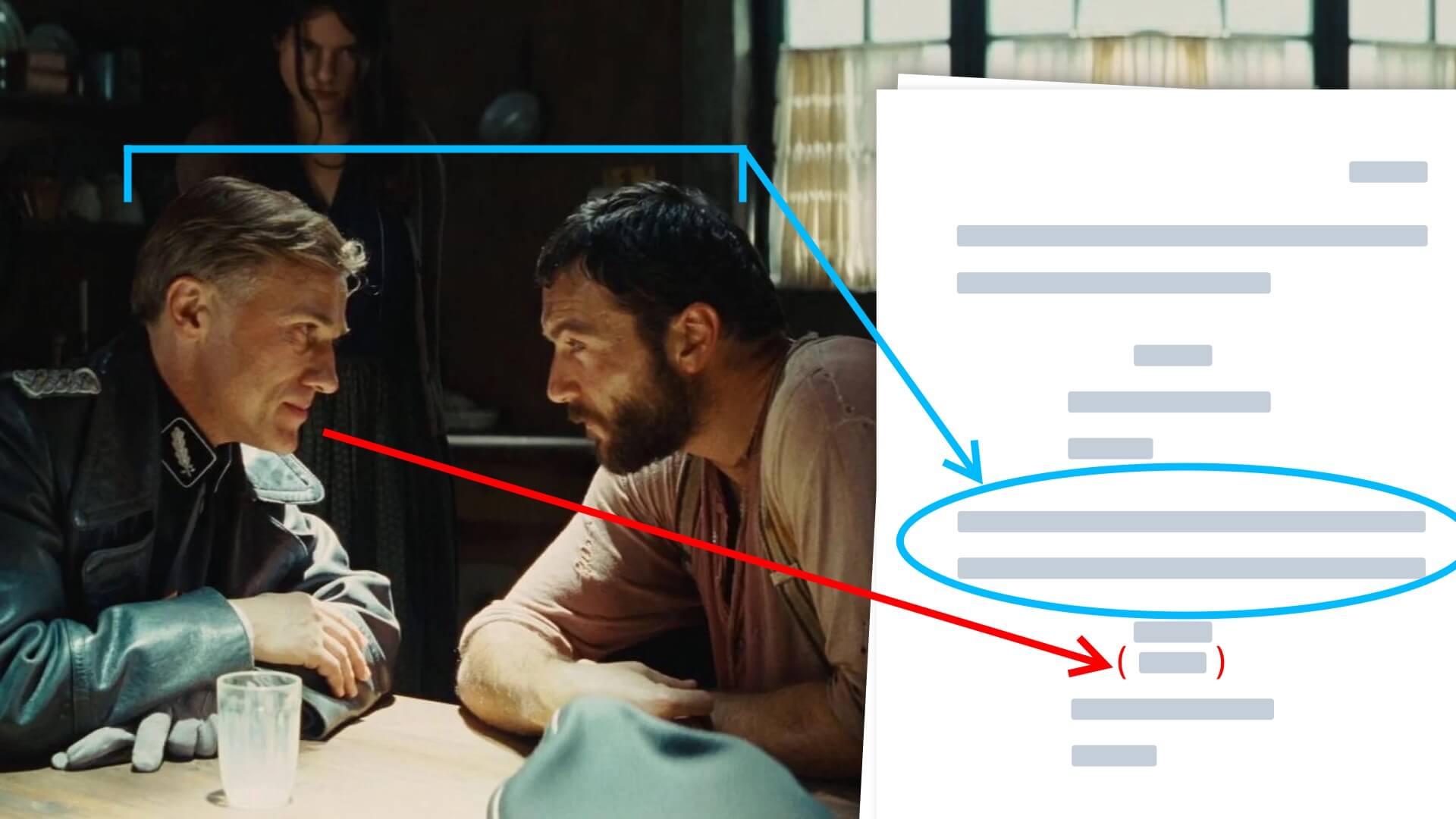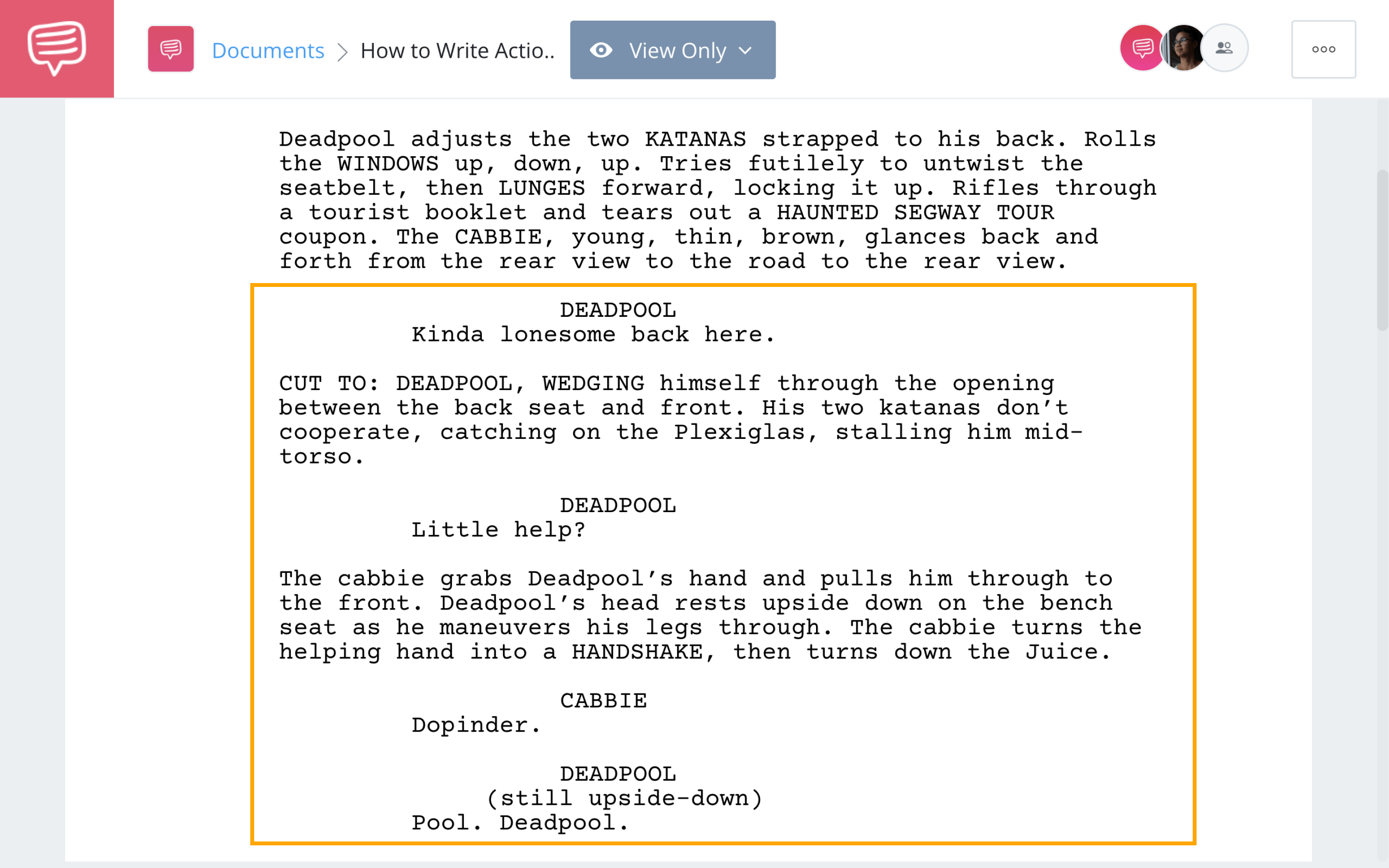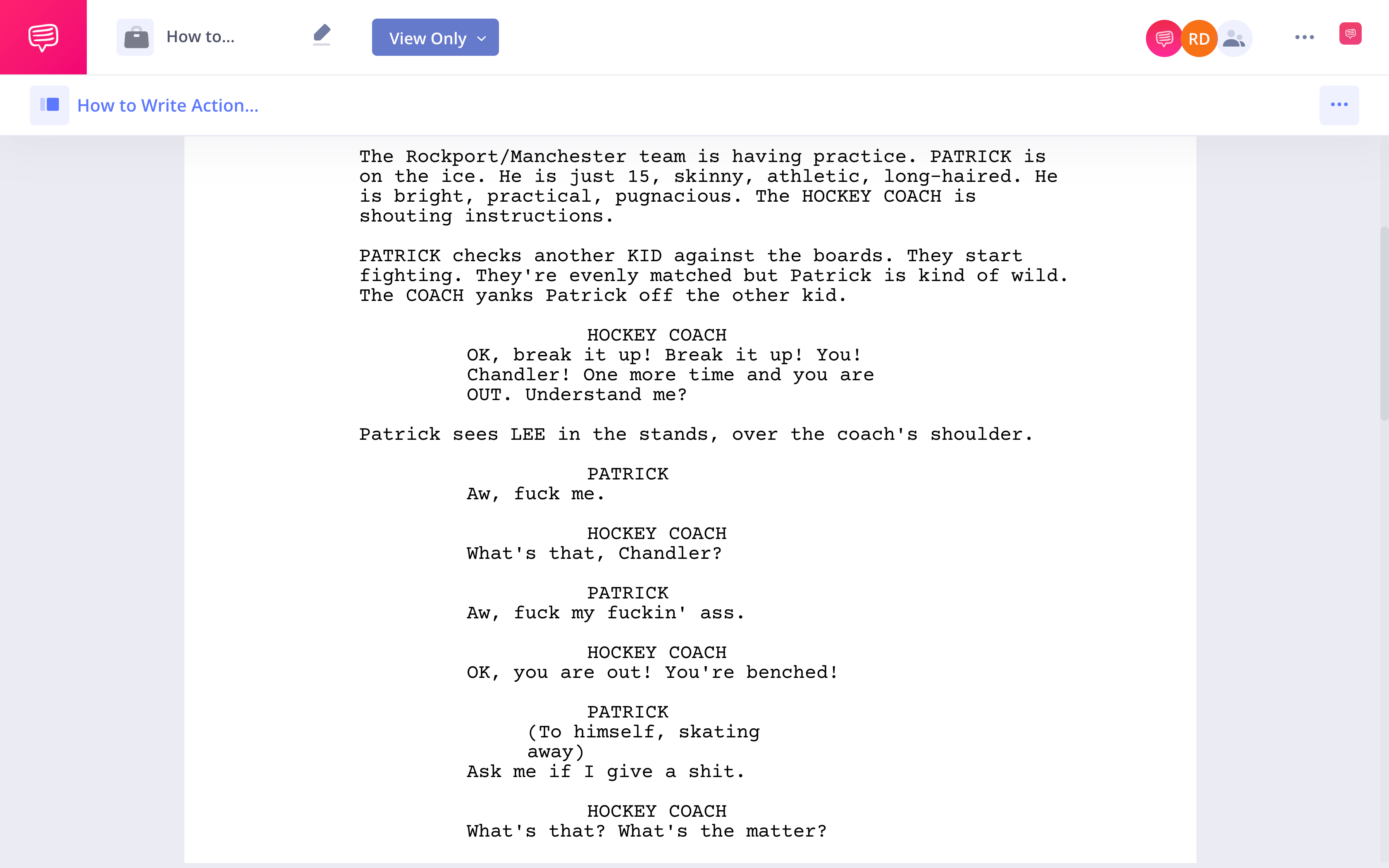Many screenwriters are praised for their witty and captivating dialogue. A skill that is far too underappreciated, however, is the ability to effectively incorporate action within a dialogue scene. Let’s take a look at how to write action breaks in dialogue and why using action within dialogue can immediately make a scene better.
Watch: Anatomy of a Screenplay — Ultimate Guide
How to Write Action Breaks in Dialogue
Screenwriting action in dialogue
Incorporating action into dialogue scenes is never a bad idea for various reasons (which we’ll get to in a bit). So let’s talk about how to write dialogue interruption properly. First, let’s look at the two most common ways to write action within dialogue sequences in a screenplay.
Parentheticals
The first way to incorporate action into a dialogue scene is by using the parenthetical. This is easy to do when using Studiobinder's screenwriting app. Simply select a new parenthetical line by choosing the “Parenthetical” icon on the top toolbar. Then insert the parenthetical at the point within the dialogue that the action occurs.
How to write action in between dialogue
It is important to note that actions described in the parenthetical are either very short or very subtle actions such as a smile, a kick, or a laugh.
A perfect example of this can be found in The Dark Knight, one of Christopher Nolan’s best films.
Check out this script to screen video comparing The Dark Knight screenplay to the actual final scene.
In The Dark Knight Interrogation Scene, small actions like the Joker smiling, laughing, spitting a tooth out, and pointing are noted in parentheticals.
How to Write Action in The Middle of Dialogue Screenplay • Example From The Dark Knight
As you can see, the actions described in the parentheticals were small. Larger actions in the fight were described using the next technique — action lines.
Related Posts
Action lines
Action lines, also called action descriptions, allow you to describe lengthier action sequences in the middle of a dialogue scene. In StudioBinder, you can create a new action line in the middle of a dialogue scene by selecting the “Action” icon on the top tool bar.

How to write action breaks in dialogue
This is typically used when larger chunks of action break up dialogue sequences. We can see this in the opening scene from the hilarious and action packed Deadpool screenplay.
We brought the Deadpool script into StudioBinder’s screenwriting app to analyze its use of action lines. Notice how the dialogue between Deadpool in the cabbie is broken up by action lines that are precisely placed.
Click the image below to read the entire scene.
Deadpool • How to write action in between dialogue
Again, notice how the action lines are used to describe more detailed and specific actions that occur within the dialogue. The action descriptions are also appropriately placed within the dialogue. Let’s take a look at the final scene to see how the small actions are executed in the dialogue scene.
Deadpool (2016) • Interrupting dialogue with action
This scene from Deadpool is a perfect example of how action, no matter how big or subtle, can make a simple dialogue scene better. Many professional screenwriters agree that incorporating actions in dialogue scenes is a good idea. Let’s take a look at why that is.
Related Posts
How to Show an Interruption in Dialogue
Interrupting dialogue with action
Action in dialogue scenes does not refer to "action" as in a fight scene. Rather, action is physical activity executed by a character. Incorporating action into dialogue scenes can make a scene better for multiple reasons.
1. Exposition
Dialogue is a very efficient way at teasing out exposition in a film. It can, however, be very "on-the-nose" and unnatural. Using action within dialogue can have expository functions.
Take a look at this video by Lesson from the Screenplay to see how exposition is handled through both action and dialogue in the The Matrix screenplay.
The Matrix • Action during dialogue screenplay
2. Develop relationships
Action in a dialogue scene can also be used to describe body language. How a person moves and physically behaves say a lot about how they feel about the person that they are talking to.
This is especially true when writing a “meet cute” scene. Check out how action is typically used within dialogue to create romantic scenes in our meet cute video essay below.
How to write interrupted dialogue screenplay format • Subscribe on YouTube
3. Establishing Tone and Mood
Actions within dialogue is an effective way to establish a film’s tone or the mood of a scene. This is especially useful when trying to incorporate humor into a dialogue scene like we saw earlier in the Deadpool screenplay.
4. Keep the plot moving
Dialogue scenes themselves can further a plot. But oftentimes, they occur while characters are doing something. Describing what the characters are doing as they talk helps to keep the plot moving.
Take this scene from Manchester by the Sea script. Writer Kenneth Lonergan introduces Patrick through a hockey fight:
Manchester by the Sea script
By including action lines between the dialogue, Lonergan creates two different dramatic threads: Patrick seeing Lee, and the Coach punishing Patrick.
Joel and CJ give pretty direct exposition, but it doesn’t feel too obvious, because of the action within the scene. They are essentially gossiping as Patrick skates over to his uncle.
5. Adds excitement
Lastly, adding action to dialogue scenes can also add excitement. Film is both a visual and auditory medium. Even the best dialogue can benefit from minor action. Whether that action is meant to express a character’s emotional state or as a means of comedic relief, finding opportunities for action within your dialogue will make for a more engaging dialogue scene.
Related Posts
UP NEXT
How to Write ‘Realistic’ Dialogue
Incorporating action into a dialogue scene is an effective way at making the dialogue appear more natural. However, nailing the dialogue itself is also important for creating authentic dialogue scenes. In our next article, we analyze a few fundamental approaches to writing realistic dialogue for compelling stories.


